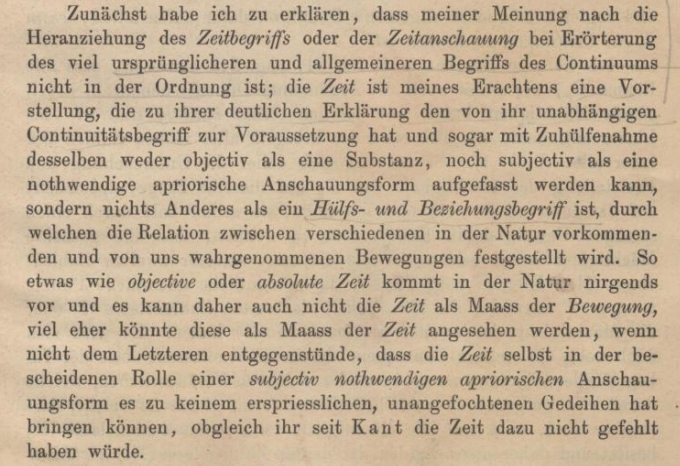Kant has featured in Geog Cantor's argument that time is irrelevant for describing the continuum.
This is a partly a (tangentially) relevant answer to the question, and partly a relevant comment on a very interesting comment at 'Asaf Karagila Oct 7 '14 at 10:47' in this thread, which in effect points out that Cantor considered Kant harmful and a bad mathematician.
I just stumbled over an 1883 passage of Cantor's in which a thirty-years-younger (than the Cantor who wrote the 1911 letter to Russell, that is) has Kant have sort-of a cameo appearance in what arguably is transfinite-set-theory's foundational-document: in [G. Cantor: Grundlagen einer allgemeinen Mannichfaltigkeitslehre. Teubner 1883, p. 29] one finds:

[my translation:]
First of all, I have to declare the following: in my opinion it is not correct to adduce a concept of time or of a (intuitive-)view-on-time [translated intentionally non-idiomatically] if one explains the much more original and general concept of the continuum; I think that time is an idea which, in order to be explained clearly, presupposes the the concept-of-the-continuum, which is independent of time; also, even with the help of the concept-of-the-continuum, [time] can neither be objectively conceived of as a substance, nor subjectively conceived of as a necessary apriori form-of-intuition, rather time is nothing other than an auxiliary and relative concept, by which one determines the relation between distinct movements which occur in nature and are perceived by us. [Some would argue that Cantor is anticipating both Einstein and Barbour here.] Something like objective or absolute time nowhere occurs in nature and therefore one also cannot view time as a measure of movement, rather, to the contrary: movement could be viewed as a measure of time, were it not for the fact that, which contradicts the latter interpretation, that time, even in its modest role of a subjectively necessary apriori form-of-intuition, has failed to reach any fruitful, unchallenged state of prosperity [Cantor gets rather ornate at this point, and, in a sense, weakens his own case by negating an extreme condition ('time has not reached an unchallenged etc etc'; what wonder.)], even though it has had enough time to do so since K a n t.
In short, Cantor uses a reference to Kant's influential philosophy to strengthen his argument that time is irrelevant for explaining the continuum.
This can be seen as an example that "philosophy" "clarified" "mathematics".
Of course (thanks to Asaf Karagila for pointing out that this was not made clear in this post), one can interpret Cantor as writing rather ironically about Kant here, proposing something like the following rhetorical question (I am paraphrasing):
'Now if what Kant wrote were so true, how come that a hundred years later [which is roughly the time span that had passed when Cantor wrote this][which is roughly the time span that had passed when Cantor wrote this] the view on 'time' as a 'subjective necessary apriori form-of-intuition', this point-of-view still has not taken hold?'
Now one can argue that Cantor's argumentation itself is a fallacy, or a rather weak charge against Kant, and by itself does not speak against Kant (let alone contradict him), since of course *it does not necessarily imply the wrongness of a view that a view is not widely held*.
This post is not to 'endorse' either of these interpretations, rather to point out a relevant and historical interesting aspect of Cantor's work.
The present observation can be seen as philosophy having clarified mathematics, if only in the indirect way that (0) Cantor seems to have disliked Kant, whether at age 37 or at age 66, and therefore (1) distanced himself from, and avoided, the use of any notion of 'time' in his mathematics.

